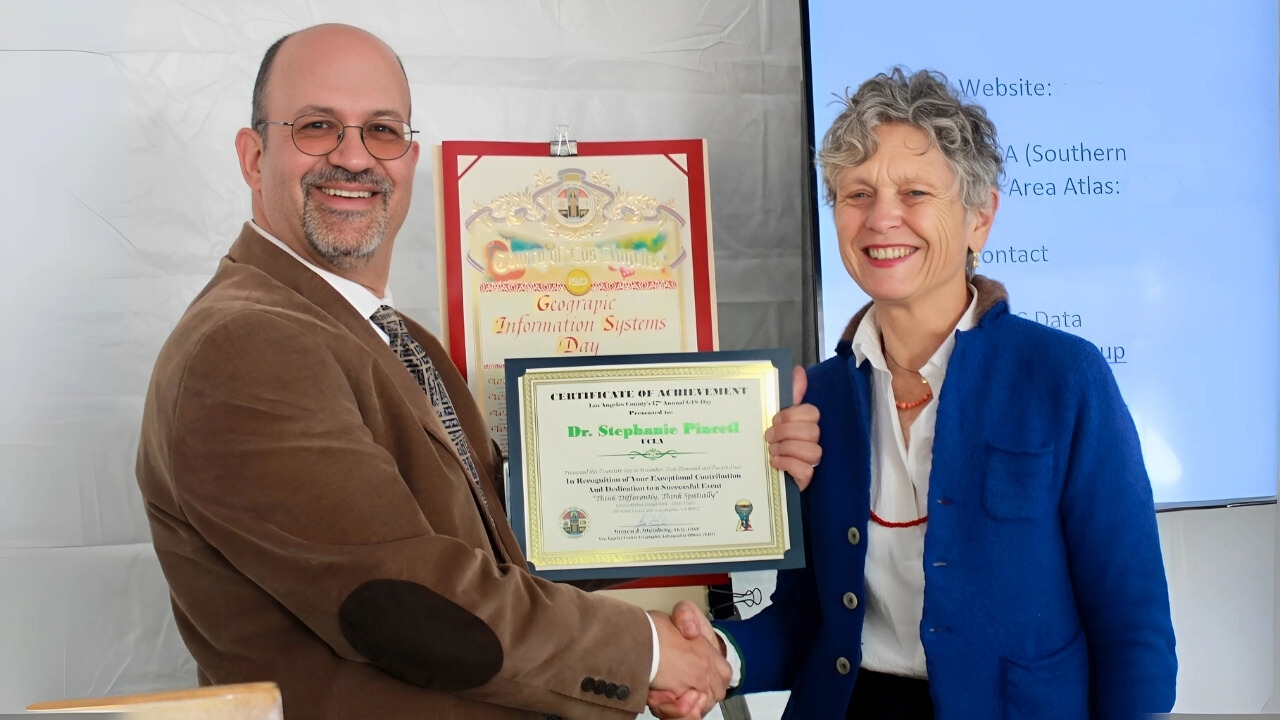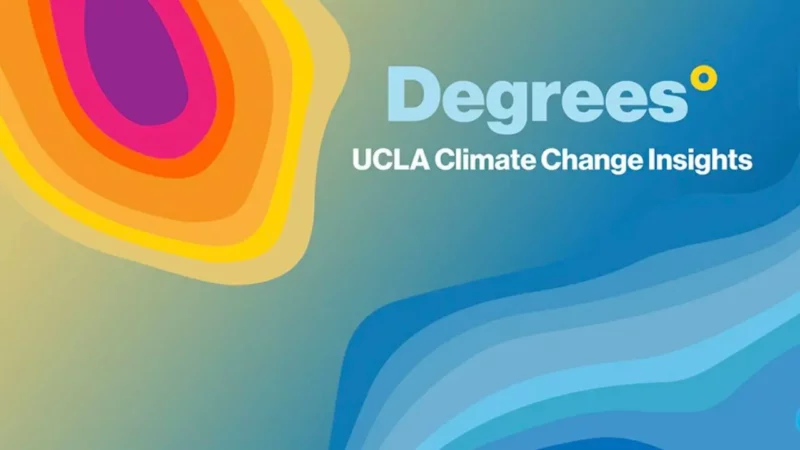
The curiosity and controversy of GMOs: a Q&A with Ted Parson
On Tuesday, April 19, four experts will debate the environmental, social and health impacts of GMO foods. Are they a solution to global health and food security crises? Or do…
Ted Parson talks about the GMO debate, labeling laws and how humans deal with big tech advances.
On Tuesday, April 19, four experts will debate the environmental, social and health impacts of GMO foods. Are they a solution to global health and food security crises? Or do they pose risks too great to take? The Oppenheim series event—with audience participation—will be live streamed here at 7:30 p.m. (This is a past event; you can watch the full video at the link.)
The discussion will be moderated by UCLA’s Ted Parson—professor of environmental law and co-director of the Emmett Institute on Climate Change and the Environment. Parson has a unique, multifaceted perspective on GMOs. His current research focuses on international environmental law, but his expertise includes physics, public policy and mathematical modeling of energy and environmental systems.
We recently sat down with Parson to talk about the public debate on GMOs and a few of the legal implications the technology brings.
Why are GMO foods an important environmental issue, in a broad sense?
Suggestions have been raised that GMO crops, foods or other organisms might pose environmental harms or risks. In a sense, those concerns are derivative of concerns that have been advanced since the beginning of genetic engineering, way back to the 1975 Asilomar Conference on Recombinant DNA. There was a moratorium on research the first time people had the capability to genetically modify living things. The interesting question is how those concerns have stood up over time, with mounting evidence and mounting experience. That is the controversy that remains today—both over appropriate regulation and over the second battlefield on labeling and disclosure laws. It’s a timely issue for this big historical moment if there are significant dangers that have not yet been recognized. Then, we would continue to run risks. It’s important to examine whether the risk concerns have adequately and honestly been put to rest by scientific research into health, environment, safety and other impacts so we can know that, on balance, GM crops provide an opportunity to better serve human needs rather than a threat to human welfare. If that’s the case, it’s time to encourage large-scale expansion in their use.
Vermont recently passed a GMO labeling law. How important is this from a legal standpoint and what do you think the long-term impact might be?
I think the interesting and, in some ways, troubling issue about labeling laws gets to the question of whether “GMOs” is even a category that makes sense. One of the strongest criticisms I’ve heard advanced against proposals for regulation or disclosure laws is that the category isn’t properly drawn. There are many ways of modifying food crops and other organisms that do not fall within the narrow technical definition of GMOs because of the methods used, but they have just as much or more capacity of producing odd, weird, strange, and potentially dangerous changes. What makes the model of labeling laws so attractive is that it’s a model of informed consumer choice. Don’t make anybody do anything, just make sure consumers are in a position to make informed decisions about what they’re going to buy. The difficulty has to do with the limiting reality of the stuff people are able to pay attention to and act upon. Do you read the complete, fold-out list of instructions and contraindications on every prescription medicine you ever take? You probably don’t—we count on doctors to advise us. Do you read the list of ingredients on everything you ever buy off the shelf? I don’t know. Some people do. I think the worry with labeling laws is that they become a symbolic encoding for alarm. And the people marketing stuff worry that the effect of a labeling law will be to basically make markets disappear, even in the absence of scientific evidence that warrants such a decision. It’s superficially attractive, but it’s more complicated and difficult than it seems.
What other legal implications are involved in GMO foods?

One is the issue of regulatory approval in different jurisdictions. There have been international trade wars over a country’s ability to decline to give regulatory approval or permitting. That was the fight between the European Union and the United States. Skepticism of GMOs in Europe is much stronger than it has been in America due differing political systems, smaller-scale agriculture and more connection to smaller scale production. All kinds of stuff like that. As a practical, de facto matter, EU put the brakes on any licensing and approval of any genetically modified food items for a period of something like 10 years. It was a bit comical from a legal perspective because they never said they were banning them and they never said they had a moratorium—in fact, they angrily declared that they never did have a moratorium. But nothing was ever getting approved, even while the scientific body charged with doing assessments was creating reports that said “this looks fine.” The United States and a couple of other agricultural producers sued and won. A World Trade Organization panel ruled that, yes, it was a moratorium and it was impermissible. It’s still tough, though. There are still a lot of obstacles to marketing or planting GM crops in the European Union. It’s still a complicated mess with one set of rules at the EU level and different sets of rules at the national level.
How has social media affected the dissemination of information on this issue?
Social media spreads slogans and spreads alarm. My off the cuff reactions? Accusations of villainy and spreading of symbol, slogan, alarm and criticism. Let’s counter-pose that with the opposite possible position. What would be the most sensible way to think about and make decisions about GMOs? What would give the most confidence that sensible people are doing the right stuff, so you could relax and not worry? That would probably be a system that involved careful scientific research into potential mechanisms by which anything could be harmed, whether it’s small-scale biochemical stuff about what’s actually in the foods or the health or ecological effects when GMOs are released into the wild. It would involve careful, impartial, impact-based risk assessment about how serious those risks are. And then there would be regulatory determinations. I don’t know whether it makes sense for decisions to be made wholesale or retail. Would you want to look individually at each one? Or is it possible that you can look at the kinds of modifications being introduced and make determinations at that level? Then, you could say “OK, this one? We see worrisome signs here. This kind of modification looks like it’s bad for pollinators. It looks like it quickly gets out of confined fields and crossbreeds with wild grasses nearby, so we’re going to presumptively say ‘no’ to this kind of modification—go back and do more research. But this one we’ve looked at hard and we see none of these worrisome effects. This one looks fine, and so, presumptively, individual proposals based upon this modification or technique are going to be fine.”
Why do you think this has become such a hot topic for the public and politicians?
It’s been a hot topic for 40 years. Big tech advances pose substantial potential consequences. Sometimes they are direct, immediate ones, where you can trace physical, chemical or biological mechanisms by which the stuff affects things we care about. And sometimes they are socially, economically or politically mediated. Sometimes, it’s stuff like “this new technology increases the ownership rights and effective control over this activity, and it’s exercised by just one or two firms.” Big tech innovations, particularly the ones that get symbolic names—artificial intelligence, nanotech, GMOs—they have very broad and very diffuse potential implications. And sometimes the consequences take a long time to observe. It’s natural that big things like this raise controversy. At early stages of the development of major new tech innovations, often there is a diffuse set of possibilities. People can spin stories whereby “this stuff is going to kill everybody.” Or, alternatively: “This stuff is going to make food dirt cheap, abundantly available and allow us to feed the world while controlling pests, diseases and weeds. It will make crops robust to climate change and let us grow crops anywhere.” There’s an open-ended range of speculations about what might happen. That naturally leads to both a curiosity and controversy. GMOs have been around for decades. Maybe now we’ve got enough experience that we can start to reach some provisional conclusions.
Published:


